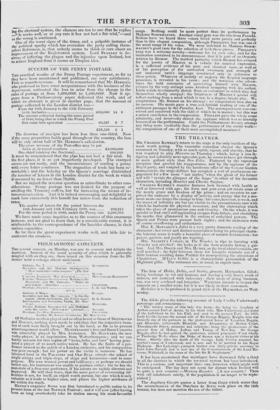PHILHARMONIC CONCERTS.
THE second concert, on Monday, was one to content and delight the musician. Instead of the usual quantity of alloy which is generally mingled with sterling ore, there issued on this occasion from the Di- rectors mint a coinage almost uudebased.
ACT 1.
Siareina, No. 7 :oot Air. MIDIDRIC STOCKHAVSEN, " I len. amid these calm recesses" (The Sea• s C' i,i to. Piatlif.',It.•. Mrs. ANDERSON
TVCZI•tio. MAWODo MallO111Ditellt•
BMW:MEIN, :ma " °oleo no mud cistern (Fauishn Ot enure, Pr( ciez:it
ACC II.
° Miner
Recitative mid Air. Mr. 1.1111.1.1PS, " Is thistle region" (from an Oratorio, The Fallen Angel) littroduction a1,.1 Polonaise, Violin, Mc. HAY-
WARD
DID•110. NIA11:1111D STDCK DACs EN and Mademoi- selle lin.' sTEIN. '• Dch in to " (Norma) Overture,1. Mrur Cm:m*1am. Issuer, Mr. Lnet a— conductor, Mr meseit Of Sinfonias so often played and so often heard as those of BEETHOVEN and iMozA nothiug more needs be said than that the respective beau- ties of each were finely brought out by the band, as far as its present raisarrangement would allow. MENDELssonx's first and finest Concerto w.as admirably played by MTS. ANDERSoN. Mr. HAYWARD, the new violin-player, is an importation from Wolverhampton ; and we can hardly account for that region of "locks, bolts, and bars" having gene- rated a player of so much native talent. lle has the faults of a per- former unused to the polish of a London orchestra, and his composition was poor enough ; but his power on the violin is immense. IIe has laboured lord in the PAGANIN/ and OLE BULL school—the school of single strings and triple stops, of skips and harmonics—and to some purpose. His tone wauted power and brilliancy ; or perhaps we should rather say, his instrument was unable to produce either ; but he has the
paterials of a first-rate performer, if his talents are rightly directed and improved. He will then learn, that the mere power of overcoming dif- ficulties is not, for itself, an object worth pursuit, but one which is only
*valuable as it leads to higher aims, and places the higher attributes of art within his reach.
Havne's exquisite Seena was first introduced to public notice in its present form at the last Norwich Festival ; and it will now (after having been so long overlooked) take its station among his most favourite
Br FTIIOVEN.
HAYDN.
MENDELSSOlIN BARTHOLDT
CHEM-RM.
C. M. TON WEBER.
MOZART.
II. II, BMW. IlAYWARD.
songs. Nothing could be more perfect than its performance by Madame STOCKHAUSEN. Another vocal gem was the trio from Fanisha. Seldom have we heard three voices blend more purely and perfectly than in this elegant composition, although PHILLies's line was out of the usual range of his voice. We were indebted to Madame STOCK- HAUSEN'S good taste for the selection of both these pieces. PHILLIPS'S song was a welcome novelty—welcome for its ownsalts', and for the intimation contained in its announcement that it is part of an Oratorio written by BISHOP. The marked partiality which Bistioe has evinced for the poetry of MILTON as a vehicle for musical expression, is a sufficient evidence of his pure and classical taste, as well as of his perception of the- unrivalled sweetness and strength of our immortal bard's , language considered only in reference to these points. Whatever of melody or majesty the English language possesses, is revealed in his verse ; and the n musicia who adven- tures the bold enterprise of associating himself with MILTON, evinces by the very attempt some kindred sympathy with his author. Little minds involuntarily shrink from an encounter to which they feel themselves wholly unequal: the brightness of MILTON'S genius will reflect nothing from a mind which is not, in a degree, bright also. We congratulate Mr. BISHOP on his attempt we congratulate him also on its success. His music gave a true and faithful reading of one of the sublimest passages in the Paradise Lost. The accompaniment was con- ceived and contrived with the skill of which he is master ; hut this was a minor excellence in the composition. PHILLIPS gave the whole scene admirably, and deservedly shared the applause whi el, was so liberally bestowed on the performance. Could the Philharmonic Society attempt any thing more creditable than the performance of the entire work— the composition of one of their most accomplished members?


























 Previous page
Previous page